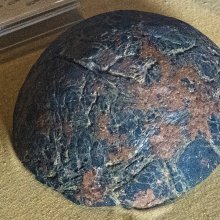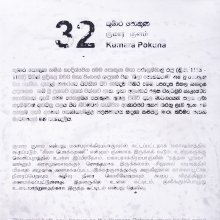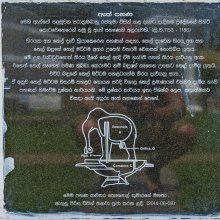Ita, Itā, Ītā: 16 definitions
Introduction:
Ita means something in Hinduism, Sanskrit, Buddhism, Pali, Marathi, biology, Tamil. If you want to know the exact meaning, history, etymology or English translation of this term then check out the descriptions on this page. Add your comment or reference to a book if you want to contribute to this summary article.
Images (photo gallery)
(+11 more images available)
Biology (plants and animals)
Source: Wisdom Library: Local Names of Plants and DrugsIta [ఈత] in the Telugu language is the name of a plant identified with Phoenix sylvestris from the Arecaceae (Palm) family having the following synonyms: Elate sylvestris. For the possible medicinal usage of ita, you can check this page for potential sources and references, although be aware that any some or none of the side-effects may not be mentioned here, wether they be harmful or beneficial to health.
Source: Google Books: CRC World Dictionary (Regional names)1) Ita in Congo is the name of a plant defined with Crinum zeylanicum in various botanical sources. This page contains potential references in Ayurveda, modern medicine, and other folk traditions or local practices It has the synonym Amaryllis disticha Sims, nom. illeg. (among others).
2) Ita in India is also identified with Ochlandra travancorica It has the synonym Melocanna travancorica Muell. (etc.).
3) Ita is also identified with Phoenix dactylifera It has the synonym Palma major Garsault (etc.).
4) Ita is also identified with Phoenix sylvestris It has the synonym Elate versicolor Salisb. (etc.).
5) Ita is also identified with Sapindus saponaria It has the synonym Cupania saponarioides Sw. (etc.).
6) Ita in Nigeria is also identified with Celtis zenkeri It has the synonym Celtis soyauxii Engl. (etc.).
Example references for further research on medicinal uses or toxicity (see latin names for full list):
· Norw. Journal of Botany (1977)
· Hortus Bengalensis, or ‘a Catalogue of the Plants Growing in the Hounourable East India Company's Botanical Garden at Calcutta’ (1814)
· Pakistan Journal of Pharmaceutical Sciences (2006)
· Annals of the Royal Botanic Garden, Calcutta. (1896)
· Investigatio et Studium Naturae (1992)
· Flora Sylvatica for Southern India (1873)
If you are looking for specific details regarding Ita, for example diet and recipes, health benefits, side effects, pregnancy safety, chemical composition, extract dosage, have a look at these references.

This sections includes definitions from the five kingdoms of living things: Animals, Plants, Fungi, Protists and Monera. It will include both the official binomial nomenclature (scientific names usually in Latin) as well as regional spellings and variants.
Languages of India and abroad
Pali-English dictionary
Source: Sutta: The Pali Text Society's Pali-English DictionaryIta, (pp. of eti, i) gone, only in cpd. dur-ita gone badly, as nt. evil, wrong Davs. I, 61; otherwise in compn. with prep. , as peta, vīta etc. (Page 118)

Pali is the language of the Tipiṭaka, which is the sacred canon of Theravāda Buddhism and contains much of the Buddha’s speech. Closeley related to Sanskrit, both languages are used interchangeably between religions.
Marathi-English dictionary
Source: DDSA: The Molesworth Marathi and English Dictionaryiṭā (इटा).—m A sort of spear. Used formerly in the field and in the exercises of the arena; now serving only to be carried before a Raja &c. in his processions.
--- OR ---
īṭa (ईट).—f (iṣṭikā S) A brick.
Source: DDSA: The Aryabhusan school dictionary, Marathi-Englishiṭa (इट).—f A brick. īṭabandī f Brick-work.
Marathi is an Indo-European language having over 70 million native speakers people in (predominantly) Maharashtra India. Marathi, like many other Indo-Aryan languages, evolved from early forms of Prakrit, which itself is a subset of Sanskrit, one of the most ancient languages of the world.
Sanskrit dictionary
Source: DDSA: The practical Sanskrit-English dictionaryIta (इत).—p. p. [i-kta]
1) gone to; रुचिरं कमनीयत रागमिता (ruciraṃ kamanīyata rāgamitā) Śiśupālavadha 6.71.
2) Returned.
3) Obtained.
4) Remembered.
5) Attended by; स खलु तुरगैः सप्तभिरितः (sa khalu turagaiḥ saptabhiritaḥ) K. P.1.
-tam 1 Course, mode of going.
2) A way.
3) Knowledge.
--- OR ---
Iṭa (इट).—Ved.
1) Cane or grass; अथो इट इव हायनोप द्राह्यवीरहा (atho iṭa iva hāyanopa drāhyavīrahā) Av.6.14.3.
2) A mat, a web made of cane or grass.
Derivable forms: iṭaḥ (इटः).
Source: Cologne Digital Sanskrit Dictionaries: Shabda-Sagara Sanskrit-English DictionaryIta (इत).—mfn.
(-taḥ-tā-taṃ) 1. Gone. 2. Remembered. 3. Obtained. E. iṇ to go, affix kta.
--- OR ---
Īta (ईत).—mfn.
(-taḥ-tā-taṃ) Gone. E. ī to go, kta aff.
Source: Cologne Digital Sanskrit Dictionaries: Cappeller Sanskrit-English DictionaryIṭa (इट).—[masculine] cane, grass; also = iṭasūna [neuter] a mat.
--- OR ---
Ita (इत).—[neuter] going, way.
Source: Cologne Digital Sanskrit Dictionaries: Monier-Williams Sanskrit-English Dictionary1) Ita (इत):—[from i] mfn. ifc. gone
2) [v.s. ...] returned
3) [v.s. ...] obtained (cf. anita, ud-ita, etc.)
4) [v.s. ...] remembered, [cf. Lexicographers, esp. such as amarasiṃha, halāyudha, hemacandra, etc.]
5) [v.s. ...] n. way, [Śatapatha-brāhmaṇa]
6) Iṭa (इट):—m. a kind of reed or grass
7) a texture woven from it, a mat, [Atharva-veda vi, 14, 3; ix, 3, 18]
8) Name of a Ṛṣi (author of [Ṛg-veda x, 171]), [Ṛgveda-anukramaṇikā]
Source: Cologne Digital Sanskrit Dictionaries: Yates Sanskrit-English Dictionary1) Ita (इत):—[(taḥ-tā-taṃ) a.] Gone; remembered; obtained.
2) Īta (ईत):—[(taḥ-tā-taṃ) p.] Gone.
Source: DDSA: Paia-sadda-mahannavo; a comprehensive Prakrit Hindi dictionary (S)Ita (इत) in the Sanskrit language is related to the Prakrit word: Iya.
[Sanskrit to German]
Sanskrit, also spelled संस्कृतम् (saṃskṛtam), is an ancient language of India commonly seen as the grandmother of the Indo-European language family (even English!). Closely allied with Prakrit and Pali, Sanskrit is more exhaustive in both grammar and terms and has the most extensive collection of literature in the world, greatly surpassing its sister-languages Greek and Latin.
Kannada-English dictionary
Source: Alar: Kannada-English corpusĪta (ಈತ):—[pronoun] this man; (referring to a man at a place relatively nearer, already referred or known to the persons who are referring to him).
--- OR ---
Īta (ಈತ):—[noun] the act or an instance of giving; donation.
--- OR ---
Īta (ಈತ):—[noun] (said of animals) a bringing forth; a giving birth.
Kannada is a Dravidian language (as opposed to the Indo-European language family) mainly spoken in the southwestern region of India.
Nepali dictionary
Source: unoes: Nepali-English Dictionary1) Ita (इत):—adv. here; hither;
2) Ita (इत):—suffix; forms passive past participial adjectives from verb roots and from modified forms of verb stems such as परिचित [paricita ] (acquainted), क्रोधित [krodhita ] (angered, angry), etc.;
Nepali is the primary language of the Nepalese people counting almost 20 million native speakers. The country of Nepal is situated in the Himalaya mountain range to the north of India.
See also (Relevant definitions)
Starts with (+307): Idaikkadar, Ita oko, Ita palm, Ita-gidi, Ita-kalli, Ita-ottunal, Ita-uta, Itab, Itabara, Itabari, Itabatane, Itac, Itacatturu, Itaccurru, Itachettu, Itachi-gaya, Itacu, Itagani, Itagi, Itah tembaga.
Ends with (+9980): Abacurnita, Abaddhacarita, Abaddhita, Abadhita, Abalambita, Abalokita, Abandhavakrita, Abandhukrita, Abarhita, Abbhacchadita, Abbhanjita, Abbhatita, Abbhita, Abbhrita, Abbhunnadita, Abbulihita, Abdhiparita, Abhakshita, Abhanita, Abharabharita.
Full-text (+369): Itas, Itahitas, Idha, Itasuna, Ida, Anvita, Itastatas, Itamutanku, Sanjaiti, Durita, Upameta, Iha, It, Lemon itam, Ithaa, Dvaita, Itam, Itha, Vita, Itakara.
Relevant text
Search found 96 books and stories containing Ita, Iṭā, Īṭa, Iṭa, Īta, Itā, Ītā, Ida, Idaa, Itha, Ithaa, Idha, Eethaa; (plurals include: Itas, Iṭās, Īṭas, Iṭas, Ītas, Itās, Ītās, Idas, Idaas, Ithas, Ithaas, Idhas, Eethaas). You can also click to the full overview containing English textual excerpts. Below are direct links for the most relevant articles:
Rig Veda (translation and commentary) (by H. H. Wilson)
Brihad Bhagavatamrita (commentary) (by Śrī Śrīmad Bhaktivedānta Nārāyana Gosvāmī Mahārāja)
Verse 2.2.149 < [Chapter 2 - Jñāna (knowledge)]
Verse 2.4.251 < [Chapter 4 - Vaikuṇṭha (the spiritual world)]
Verse 2.2.238 < [Chapter 2 - Jñāna (knowledge)]
Garga Samhita (English) (by Danavir Goswami)
Verse 5.20.40 < [Chapter 20 - The Liberation of Ṛbhu Muni During the Rāsa-dance Festival]
Verse 5.4.32 < [Chapter 4 - The Journey to Śrī Mathurā]
Verse 3.9.17 < [Chapter 9 - The Birth of Śrī Girirāja]
Marpessa < [March 1944]
Who’s Who Among Our Contributors < [January – March, 2004]
The Neighbours < [January – March, 2004]
Shrimad Bhagavad-gita (by Narayana Gosvami)
Verse 7.5 < [Chapter 7 - Vijñāna-Yoga (Yoga through Realization of Transcendental Knowledge)]
Verse 14.3 < [Chapter 14 - Guṇa-traya-vibhāga-yoga]
Verse 14.1 < [Chapter 14 - Guṇa-traya-vibhāga-yoga]
Dhammapada (Illustrated) (by Ven. Weagoda Sarada Maha Thero)
Verse 286 - The Story of Mahādhana, a Merchant < [Chapter 20 - Magga Vagga (The Path)]
Verse 17 - The Story of Devadatta < [Chapter 1 - Yamaka Vagga (Twin Verses)]
Verse 15 - The Story of Cundasūkarika < [Chapter 1 - Yamaka Vagga (Twin Verses)]
Related products






